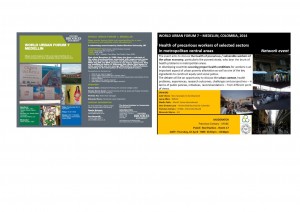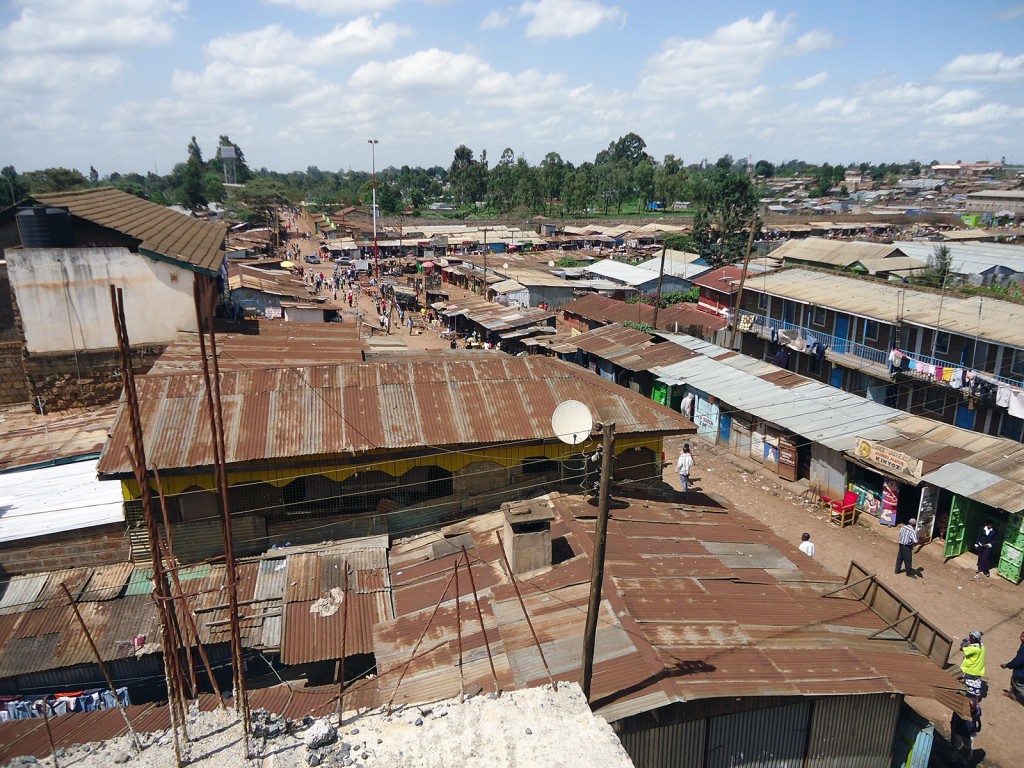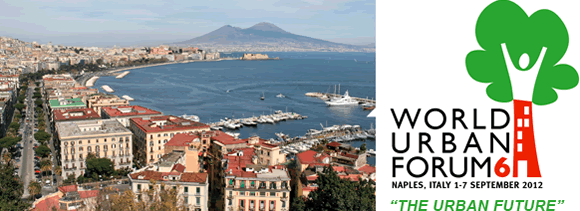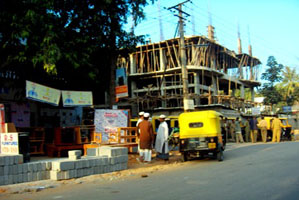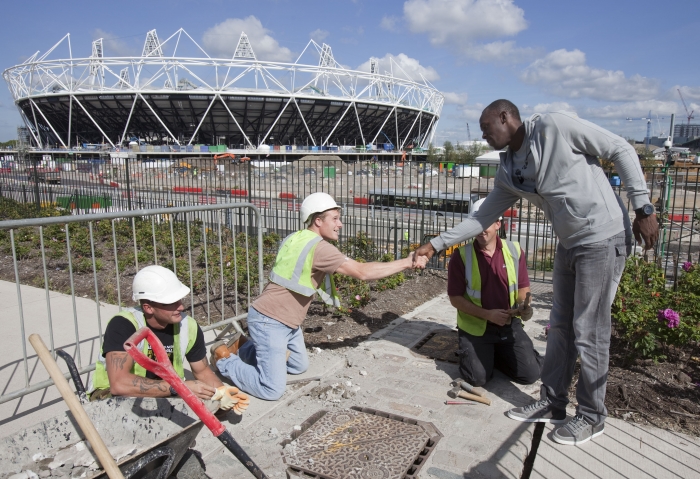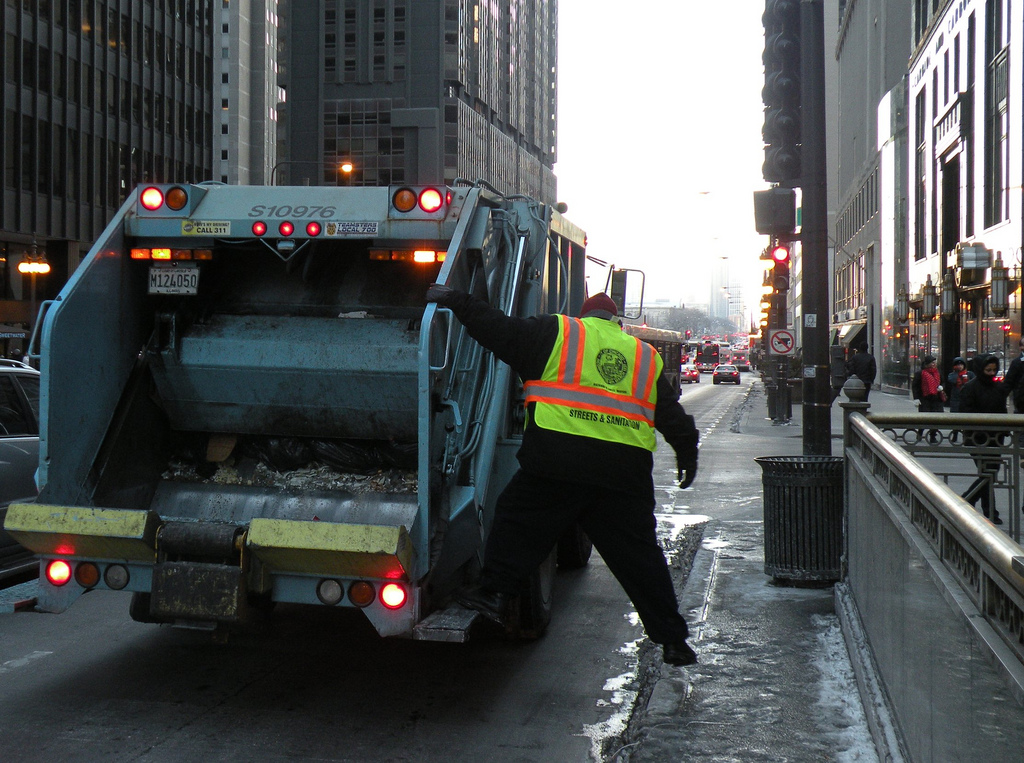
COVID19 and URBAN WORKERS
What is the fate of the poor urban workers during the COVID19 crisis? There have been much talk, but what are the good policies and actions? Especially in the Global South, there are masses of poor urban workers who need to go to the streets and mingle with people in order to survive. Many need to sell a product or service face-to-face in order to eat at that same day – and to support a family. To force these people to stay at home without social protection is a death sentence by starvation. To go to the streets and get infected, especially those with a high level of malnutrition and low immunological resistance, is not a very comfortable alternative either. It is necessary to quickly implement social protection schemes that protect the poor. Innovations in personal protective equipment to allow them to continue working without the risk of infection are also crucial. The production of such equipment can also be a way to bring much needed cash to at least some groups of workers who could engage in such work. The same for delivering cleaning and sanitation services to public institutions as well as businesses, to continue working.
Urban labour and livelihoods included in the Quito Declaration, Habitat III (New Urban Agenda)
The Habitat III Declaration – the NUA (New Urban Agenda) – has included references to labour and livelihoods, under the broad concept of Decent Work. For specific material on this topic in the Habitat III process, see http://habitat3.org/the-new-urban-agenda/preparatory-process/united-nations-task-team/international-labor-organization/
In addition to employment creation, decent work also encompasses social protection, workers’ rights and social dialogue, which are also critical for urban poverty alleviation.
Now it is opportune to discuss ways through which the New Urban Agenda can lead to concrete policies and actions which combine housing, human settlements’ development and decent work.
Initiatives such as infrastructure provision, upgrading of low-income neigbourhoods and inner-city regeneration will be viable and will lead to inclusive growth when employment-generation and working conditions are properly addressed.
Decent work should be integral part of urban policies and management. To use the expansion and maintenance of the built environment to provide opportunities of decent work. Conversely decent jobs are an important lever for inclusive urbanization.
Suggested lines of action, such as:
1.Include labor standards in the procedures for public procurement contracts and other elements for the implementation of the New Urban Agenda.
2.Raise the awareness and build the capacity of government authorities and public sector workers to embed decent work in its activities to expand and upgrade human settlements and via policies to stimulate the local economy.
- Link support to business development with the promotion of decent work including compliance with labor standards.
- Provide innovate financial mechanisms to create decent jobs. If finance generates more jobs and improve working conditions, this will have not only a social but also an economic impact on human settlements, generating further financial resources through progressive taxation systems.
Habitat III is the United Nations Conference on Housing and Sustainable Urban Development to take place in Quito, Ecuador, October 2016. In resolution 66/207 and in line with the bi-decennial cycle (1976, 1996 and 2016), the United Nations General Assembly decided to convene, the Habitat III Conference to reinvigorate the global commitment to sustainable urbanization, to focus on the implementation of a New Urban Agenda, building on the Habitat Agenda of Istanbul in 1996.
In 1996, Habitat II highlighted the need to generate employment. While this remains important, and is indeed one of the pillars of the Decent Work Agenda, the other pillars are also crucial for sustainable urban development. In this account, it is proposed that Habitat III takes a step beyond Habitat II, by encompassing and integrating all the elements of the Decent Work Agenda, and indeed, by localizing the Agenda.
Due to the current worldwide trend towards decentralization, local governments and other local actors are likely to be more and more directly involved on labour issues. Local authorities have been increasingly faced with the challenge of improving livelihoods in their municipalities. They also feel the impact of unemployment and underemployment through decreased tax revenues, increased welfare expenditures, and the escalation of crime and social unrest. While many actions to support livelihoods have been accomplished, much more still needs to be done, given the prevailing magnitude of poverty and the decent work challenges in urban areas.
WORLD VISION & URBAN LABOUR (2): EXAMPLE FROM ORLANDO EAST
September 20, 2013
World Vision Australia has considerable experience in economic development programming in rural areas. But with half the world’s population now in urban areas, is urban programming just rural programming with more people and fewer trees? A recent review of a pilot project in Orlando East, South Africa provided some insights. Not least was the importance of understanding how the development of an urban area influences its labour market and employment opportunities.
Orlando East forms part of the world famous Soweto township, 23 kilometres south of Johannesburg. (The name Soweto is an acronym for South Western Township). The first thing anyone coming to Soweto quickly realises is that it is a large, complex and dynamic place. The 2001 census counted 858,644 people; by 2008 the population was estimated to be 1.3 million and is currently believed to be more than 2 million, reflecting sustained migration from both other parts of South Africa, and the African continent more generally. And while Soweto is frequently referred to as a low income area, the spread of income (or perhaps more accurately wealth) is wide (including allegedly 50 millionaires residing in Soweto).
It soon became apparent that for economic development programming in Soweto to have a reasonable chance of success, it was important to understand the area’s wider economic and social background and current economy. Probably more than in isolated rural contexts, knowledge of key features of the local economy such as its historical development, employment and unemployment levels and trends, main activities, the age and size of the population, and links to local, national, and international markets is essential to help identify employment and business opportunities and obstacles in urban areas.
The economy of Soweto has been shaped considerably by its history. Various pieces of apartheid era legislation limited employment in Soweto to seven categories – operating general shops, butcheries, eating houses, selling milk or vegetables, or hawking goods. These restrictions encouraged the development of a substantial informal economy. Further, the legacy of the discriminatory and under-resourced apartheid era education system is still being felt today, and is apparent in low skill levels in Orlando East.
The economy of Soweto is also influenced by its proximity to Johannesburg, the biggest city in South Africa. Johannesburg is the main financial centre of Africa; it is the base for South Africa’s five TV stations; it is claimed to have the best telecommunications and technology on the African continent; and there is a range of manufacturing in and around Johannesburg. Yet despite its physical size and proximity to Johannesburg, Soweto’s formal economy has made only a small contribution to the overall Johannesburg metropolitan economy, and unemployment in Soweto is high.
The need to understand the context where we were working highlighted the importance of partnering. The complexity of many urban environments makes partnering even more important than in rural areas. Careful choice of partners brings valuable skills and knowledge to a project. To help generate job opportunities in Orlando East, World Vision has worked with the Small, Medium and Micro Enterprise Forum (SMME). SMME identified business registration as a major obstacle facing small businesses and tradespeople. To be eligible to tender for government contracts, businesses need to be registered. By assisting in this process, SMME has opened the way for local businesses to grow and increase employment. More recently, SMME has begun to investigate the provision of finance to small businesses to help them expand further.
No less important, the experience of reviewing the Orlando East program reinforced the importance of advocacy. Put simply, there are typically many more rules and regulations in urban areas (or at least they are more likely to be enforced). An example in Orlando East is the regulations and restrictions facing informal traders. These are a significant feature of the economy and can limit opportunities for people to increase their very low incomes. Facilitating and supporting communities negotiate with the relevant authorities takes on added importance in the big, and even not so big, city.
Edward B. Fiske and Helen F. Ladd Elusive Equity: Educational Reform in Post-Apartheid South Africahttp://books.google.com.au/books?hl=en&lr=&id=PC2chdPJE_4C&oi=fnd&pg=PR9&dq=apartheid+education+restrictions+soweto&ots=H3AJY-I2DP&sig=_zHPJ1qley8KSCDURJ5tVl3NMMg#v=onepage&q&f=false
Education in South Africa – Still Dysfunctional The Economist January 21st, 2012 http://www.economist.com/node/21543214
WOLD VISION AND URBAN LABOUR: EXAMPLE FROM NAIROBI
August 06, 2013
The 21st Century is proving to be an urban century. Cities are growing by 60 million people each year, with poverty expanding across the rural-urban continuum. This is presenting a dilemma for NGOs and challenging the traditional models of development. Urban contexts are characterised by complexity, and are often fluid and changing, which differs greatly from stable, more cohesive rural communities. This two-part blog series explores how World Vision – as a global development, humanitarian aid and advocacy organisation – has been adapting its approach to local economic development and labour in urban poverty reduction programs.
Waste management in Nairobi
The Kenyan capital of Nairobi is experiencing rapid urban population growth – among the highest rates in Africa. Slums and informal settlements are absorbing up to 75% of this growth, creating significant infrastructure and service challenges for the city. Among the biggest concerns is solid waste management, with city authorities lacking the capacity to extend services to informal settlements, and thus failing to meet the social, economic and environmental challenges that increased solid waste generation presents.
Against this backdrop, World Vision in Kenya has engaged youth in Kariobangi and Korogocho, Nairobi, to help improve the management of solid waste in urban slums and create safe and sustainable sources of income for young people.
The raw material of household solid waste may appear to have limited value. However, when an informal waste picker sorts this waste, and then finds and cleans recyclable materials – PVC bottles, paper and cardboard, glass and metals, for instance – the waste begins to accrue monetary value. The recycling and re-processing of urban waste as a unique semi-renewable ‘natural resource’, which can be run and re-run through the value chain several times, offers potential for income generation at multiple levels. For the urban poor, in particular, waste sector employment offers a low barrier for entry into the informal labour market.
There are, however, a number of mitigating factors which constrain the ability of waste sector workers to derive a fair and sustainable income. For many of the residents of Kariobangi and Korogocho, including children, waste sector work is largely unregulated and unprotected. Living and working at dumpsite areas has serious health and social risks, and a low social and economic value is placed on their work. Despite the vital collection and disposal services they provide to households, residents and businesses, many young people engaged in waste work are not fairly compensated, and thus forced into illegal activity to supplement their income. A state of high insecurity prevails in the area.
To address this informal waste labour challenge in Nairobi, World Vision is leveraging its strength as a community organising and mobilisation agency in the area. Previously disconnected Self Help Groups (SHGs) and other informal institutions have joined together in a waste management alliance, with support from World Vision to combine and enhance their efforts.
The World Vision project is building the necessary expansion capital – social and financial – to enable these groups to improve their current situation. The new alliance has greater legitimacy and influence, both with the local government and the broader community, to advocate for better treatment and support. The business models and operations of alliance members have also improved through education on low-cost recycling solutions, marketing, technology and entrepreneurship training, and links with networks of external stakeholders and government. A comprehensive value chain analysis has also built shared understanding between members of the waste stakeholders and processes that can be influenced to improve from a marginal ‘trickle down’ to a more equitable flow of profits in the sector.
This process has also made it possible for World Vision – as a large, Western INGO – to reflect on its role in supporting urban economic development and ‘fair and decent work’ in the informal economy. By focusing on facilitation and training, and playing a ‘behind the scenes’ role in supporting existing informal institutions, agencies like World Vision can enable informal sector workers to expand and strengthen their income streams. Leveraging its strength as a community development organisation, World Vision can apply social mobilisation, advocacy and analytical approaches to influence the economic situation for slum dwellers.
For more information about World Vision urban initiatives, please contact urban_programming@wvi.org, or visit www.wvi.org/urban
UNITED CITIES AND LOCAL GOVERNMENTS (UCLG) SIGNS MEMORANDUM OF UNDERSTANDING WITH THE INTERNATIONAL LABOUR ORGANIZATION
November 29, 2012
As Local Economic and Social Development are increasing priority in local governments agenda, UCLG has signed a Memorandum of Understanding with the United Nations International Labour Organization ILO.
The ILO is the international organization responsible for drawing up and overseeing international labour standards. It is the only ‘tripartite’ United Nations agency that brings together representatives of governments, employers and workers to jointly shape policies and programmes promoting Decent Work for all. This unique arrangement gives the ILO an edge in incorporating ‘real world’ knowledge about employment and work.
UCLG is looking forward to involve ILO in the agenda around Local Economic Development and job creation, not only positioning these topics in the joint political agenda, but also in practical areas such as knowledge sharing and learning between cities or other mutually complementary activities. Both organization look forward to contribute to extended knowledge and innovation around topics such as employment, informality and youth.
The agreement was signed by the Secretary General Mr Juan Somavia and by Secretary General Mr Josep Roig.
First practical cooperation took place on 8 November, where UCLG and ILO organized a peer learning activity in Maputo, Mozambique, on the informal economic sector in Maputo, and more specifically the conditions of informal vendors in the city.
Participants included representatives of the local authorities of the capital city and other cities in the country. Conceived as a South-South and triangular cooperation initiative, the event saw presentations by representatives of the cities of Durban (South Africa), Belo Horizonte and Porto Alegre (Brazil). The discussion focused on the current situation of the informal sector in Maputo and how to improve it in terms of health and social vulnerability. The representative of the authorities of Durban gave a presentation on the transformation of an important market in Warwick. The ILO presented a study of women working in the informal sector, showing gender differences in access to health, security, resources and education. The municipal authorities of Durban and of Belo Horizonte have worked with the ILO in improving access to decent work in the informal sector, and their experience was highlighted.
At its conclusion the workshop adopted a roadmap, committing to the development and implementation of South-South and triangular cooperation between local authorities in the area of local economic development and decent work. This roadmap will be submitted to the Local and Regional Leaders World Summit to be held during the next UCLG Congress (Rabat, 1-4 October 2013).
For more information: http://www.uclg.org/en/media/news/uclg-signs-memorandum-understanding-international-labour-organization
URBAN LABOUR-RELATED ACTIVITIES DURING THE WORLD URBAN FORUM 6 IN NAPLES
August 15, 2012
The event aims at discussing key issues related to labour in sectors of the urban economy and possible ways to foster a network of practitioners and researchers with a specific interest on the theme.
The event will be an opportunity for all of those with an interest on urban labour to get together, define key issues for research and practice, building upon the efforts made so far, with a view to the future.
One possibility to work together – to be discussed during the event – will be via the Urban Labour Network, strengthening it and moving it forward beyond knowledge-sharing. Alternative possibilities to work together may also come up during the event.
The presenters are from different types of institutions and with different experiences in regard to labour in urban areas. Each presenter at the event will address two points:
1. Major issues related to labour in the sectors of the urban economy, and possible solutions.
2. How to work together, promoting and strengthening a network. Why and how people with a specific interest on urban labour should get together through a network? What are the benefits, and how can we advance this in the future?
The presentations will be followed by discussion.
. Organization & moderation: Edmundo Werna (ILO)
. Technical support to organization: Fernanda Lonardoni (ILO)
LABOUR IN LARGE-SCALE URBAN OPERATIONS: THE CASE OF INTERNATIONAL GAMES
November 04, 2011
The preparation for international games such as world football cups and olympic games entails large-scale urban operations, with the construction or renovation of sports facilities, accommodation for athletes and tourists, facilities to cater for tourists, infrastructure and many times also ‘beautification’ of cities. It is an opportunity to boost economic and social development in the cities which host the games. Such operations entail oportunities for enterprises and for a large number of workers. It is important to ensure decent working conditions, entailing a positive impact in urban poverty alleviation. It is also important to spread opportunities for as many enterprises as possible, diversifying economic gains. In addition, such operations should not come at the cost of large displacement of the urban poor. One way to achieve these aims is to ensure social dialogue involving all actors throughout the entire process. International games are very visible and therefore can also be a case-model for many other urban works to follow.
For an analysis of labour-related issues in past olympic games, see the set of articles “Olympic sites: a celebration of Olympic values?” in the “Publications” section at http://www.clr-news.org/
A SECTORAL APPROACH TO DECENT WORK IN URBAN AREAS
September 12, 2011
Cities and towns are engines of economic growth. Yet, for this potential to be fully realized, attention needs to be paid to employment generation, improvement of working conditions, enterprise development and many other aspects related to labour. Cities and towns will not be sustainable if the livelihoods of their inhabitants are not addressed. This leaflet (Urban Economy Fact Sheet) is about decent work in urban areas. It explains the relevance of a sectoral approach to labour related challenges in the urban economy and presents the specific view points of the Sectoral Activities Department of the International Labour Organization.

